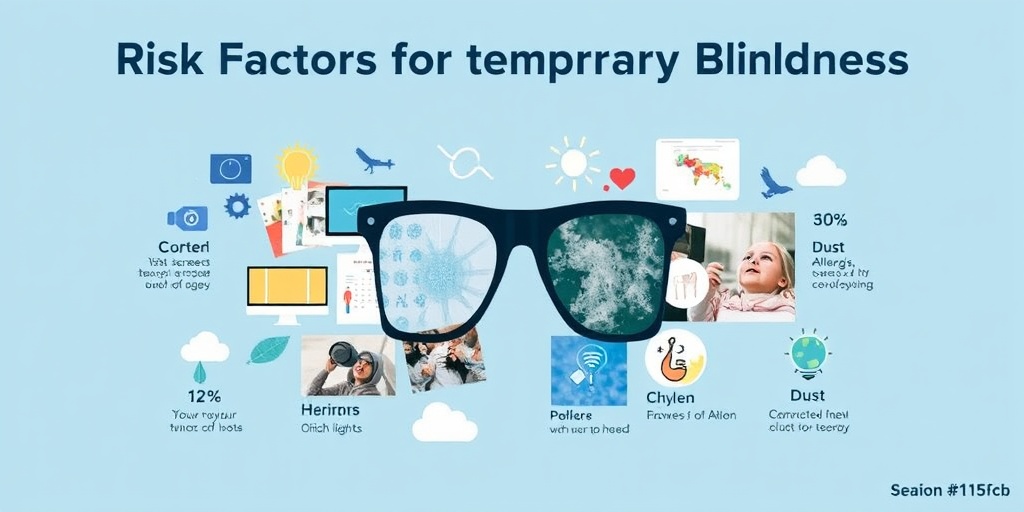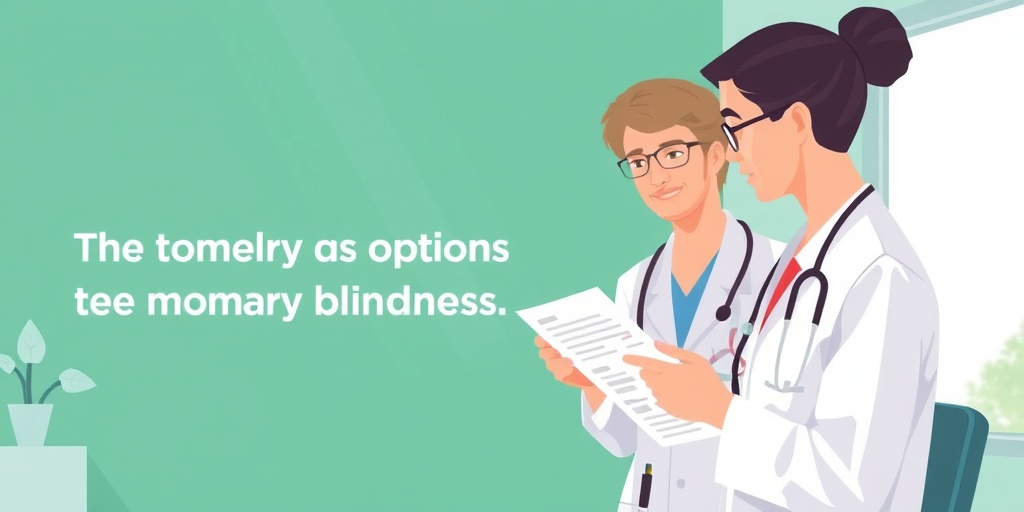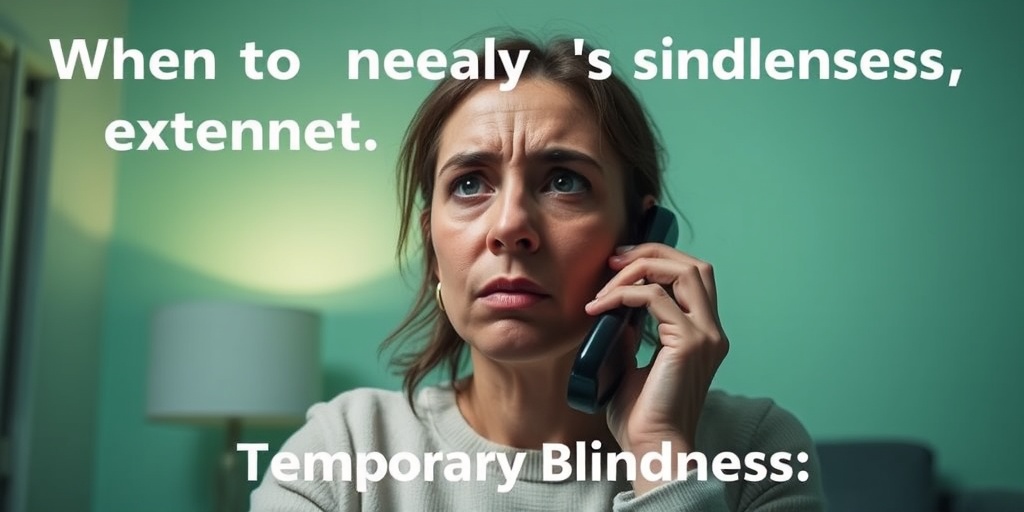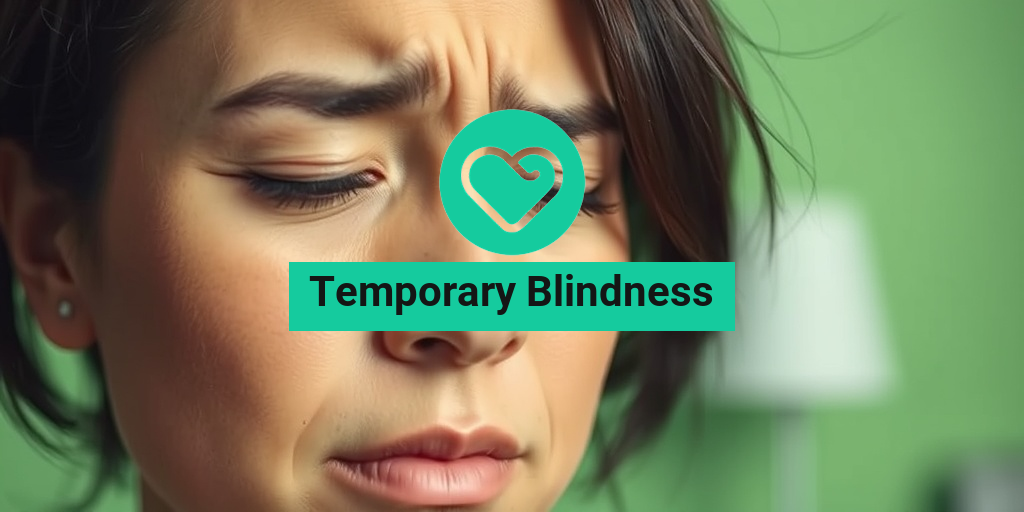What Is Temporary Blindness?
Temporary blindness, as the name suggests, refers to a short-lived loss of vision that can affect one or both eyes. This condition can be alarming, especially if it occurs suddenly. While it may last only a few seconds to several hours, understanding its causes and implications is crucial for maintaining eye health.
Temporary blindness can arise from various factors, including stress, migraines, head injuries, or even certain medical conditions. It is essential to recognize that while the term “blindness” is used, it typically does not indicate permanent damage to the eyes or vision. Instead, it often serves as a warning sign that something may be amiss in the body.
Common Causes of Temporary Blindness
- Stress: High levels of stress can lead to temporary blindness, often accompanied by other symptoms like headaches or dizziness.
- Migraine: Some individuals experience temporary vision loss as part of a migraine aura, which can precede or accompany a migraine headache.
- Head Injury: Trauma to the head can disrupt normal vision temporarily, necessitating immediate medical attention.
- Pregnancy: Hormonal changes during pregnancy can lead to temporary vision disturbances, including blindness.
- Medical Procedures: Anesthesia used during surgeries can sometimes result in temporary blindness as a side effect.
- Animal Health: Temporary blindness can also occur in pets, such as dogs and cats, due to various health issues.
If you experience temporary blindness, it is essential to consult a healthcare professional to determine the underlying cause and receive appropriate treatment. For more detailed information and resources, you can visit Yesil Health AI, which offers evidence-based health answers.
Symptoms of Temporary Blindness
Recognizing the symptoms of temporary blindness is vital for timely intervention and management. While the primary symptom is, of course, a loss of vision, there are often accompanying signs that can help identify the underlying cause.
Key Symptoms to Watch For
- Sudden Vision Loss: This is the most apparent symptom, which can occur in one or both eyes.
- Visual Disturbances: Some individuals may experience blurred vision, spots, or flashes of light before the onset of temporary blindness.
- Headaches: Many people report headaches or migraines coinciding with episodes of temporary blindness.
- Dizziness or Lightheadedness: These sensations can accompany vision loss, particularly if stress or anxiety is a contributing factor.
- Nausea: In some cases, nausea may occur, especially if the temporary blindness is related to a migraine.
It’s important to note that while temporary blindness can be benign, it can also signal more serious health issues. If you experience these symptoms, especially if they are recurrent or accompanied by other concerning signs, seek medical advice promptly.
When to Seek Medical Attention
While temporary blindness may resolve on its own, there are specific situations where immediate medical attention is necessary:
- If the blindness lasts longer than a few minutes.
- If it is accompanied by severe headaches, confusion, or difficulty speaking.
- If you have experienced a head injury prior to the onset of symptoms.
- If you notice any changes in your overall health or vision that persist.
In conclusion, understanding temporary blindness is essential for recognizing its symptoms and knowing when to seek help. Whether it’s due to stress, migraines, or other factors, being informed can empower you to take action and protect your vision. For more insights and health-related queries, don’t hesitate to check out Yesil Health AI for reliable information. 🌟

Common Causes of Temporary Blindness
Temporary blindness, while alarming, can often be attributed to a variety of causes. Understanding these causes can help individuals recognize symptoms and seek appropriate care. Here are some of the most common reasons for experiencing temporary blindness:
1. Stress and Anxiety
One of the surprising causes of temporary blindness is stress. High levels of anxiety can lead to visual disturbances, including temporary loss of vision. This phenomenon is often referred to as temporary blindness from stress. When the body is under extreme stress, it can trigger a fight-or-flight response, affecting blood flow and leading to visual impairments.
2. Migraines
Many individuals who suffer from migraines report experiencing temporary blindness from migraine. This can manifest as a temporary loss of vision or visual aura, which may precede or accompany a migraine headache. The visual disturbances can last from a few minutes to an hour, and while they can be disconcerting, they typically resolve as the migraine subsides.
3. Head Injuries
Temporary blindness can also occur after a head injury. Temporary blindness after head injury may result from concussion or other trauma to the brain. In such cases, it’s crucial to seek medical attention to rule out any serious complications.
4. Anesthesia
Some individuals may experience temporary blindness after anesthesia, particularly following surgeries that require general anesthesia. This condition is usually short-lived, but it’s essential to discuss any concerns with your healthcare provider before undergoing any procedure.
5. Pregnancy-Related Changes
Pregnancy can bring about numerous changes in a woman’s body, including hormonal fluctuations that may lead to temporary blindness during pregnancy. These changes can affect vision due to increased fluid retention or pressure on the optic nerve. If you experience such symptoms while pregnant, it’s important to consult with your healthcare provider.
6. Eye Conditions
Certain eye conditions, such as retinal detachment or vitreous detachment, can cause temporary blindness. These conditions may require immediate medical attention to prevent permanent vision loss. If you experience sudden vision changes, it’s vital to seek help promptly.
7. Animal Health Issues
Temporary blindness isn’t limited to humans; it can also affect our furry friends. Temporary blindness in dogs and temporary blindness in cats can occur due to various health issues, including stress, eye injuries, or underlying medical conditions. Pet owners should monitor their pets closely and consult a veterinarian if they notice any unusual behavior or symptoms.
Risk Factors for Temporary Blindness
Understanding the risk factors associated with temporary blindness can help individuals take preventive measures and seek timely medical advice. Here are some key risk factors to consider:
1. Age
As individuals age, they may become more susceptible to conditions that can lead to temporary blindness. Older adults are at a higher risk for eye diseases and other health issues that can affect vision.
2. Pre-existing Health Conditions
Conditions such as diabetes, hypertension, and migraines can increase the likelihood of experiencing temporary blindness. Managing these conditions effectively is crucial for maintaining overall eye health.
3. Stress Levels
High stress levels can significantly impact vision. Individuals who frequently experience stress or anxiety may be at a greater risk for temporary blindness due to the physiological effects of stress on the body.
4. Recent Surgeries
Individuals who have recently undergone surgery, especially those involving anesthesia, may be at risk for temporary blindness. It’s important to follow post-operative care instructions and report any unusual symptoms to a healthcare provider.
5. Environmental Factors
Exposure to bright lights, extreme temperatures, or other environmental stressors can trigger temporary blindness in some individuals. Taking precautions in such environments can help mitigate these risks.
6. Family History
A family history of eye conditions or neurological disorders can increase the risk of experiencing temporary blindness. Individuals with such a history should have regular eye exams and discuss their family history with their healthcare provider.
In conclusion, while temporary blindness can be concerning, understanding its common causes and risk factors can empower individuals to seek appropriate care and take preventive measures. If you or someone you know experiences symptoms of temporary blindness, it’s essential to consult a healthcare professional for a thorough evaluation and guidance. 🩺👁️

Diagnosis of Temporary Blindness
Temporary blindness, while alarming, can often be diagnosed through a series of straightforward assessments. Understanding the underlying causes is crucial for effective treatment. Here’s how healthcare professionals typically approach the diagnosis of this condition.
Initial Assessment
When you visit a healthcare provider with symptoms of temporary blindness, the first step is usually a thorough medical history review. This includes discussing:
- Your symptoms: When did they start? How long do they last?
- Any recent head injuries or trauma
- Stress levels and emotional health
- Any medications you are currently taking
- Family history of eye conditions
Understanding these factors helps the doctor narrow down potential causes of your temporary blindness.
Eye Examination
Following the initial assessment, a comprehensive eye examination is conducted. This may include:
- Visual acuity tests: To measure how well you can see at various distances.
- Pupil response tests: To check how your pupils react to light.
- Fundoscopy: To examine the back of your eye for any abnormalities.
These tests help identify any immediate issues affecting your vision, such as retinal detachment or other ocular conditions.
Additional Diagnostic Tests
In some cases, further tests may be necessary to determine the cause of temporary blindness. These can include:
- CT or MRI scans: To check for any structural issues in the brain, especially if there has been a head injury.
- Blood tests: To rule out systemic conditions like diabetes or hypertension that could affect vision.
For specific cases, such as temporary blindness during pregnancy or after anesthesia, additional specialized tests may be warranted to ensure both maternal and fetal health.
Treatment Options for Temporary Blindness
Treatment for temporary blindness largely depends on the underlying cause. Here are some common approaches that healthcare providers may recommend:
Addressing Underlying Conditions
If your temporary blindness is linked to a specific condition, such as temporary blindness from stress or migraines, managing that condition is key. This may involve:
- Stress management techniques: Such as mindfulness, yoga, or therapy.
- Medication: For migraines or other underlying health issues.
By addressing the root cause, you can often alleviate the symptoms of temporary blindness.
Emergency Treatments
In cases where temporary blindness is caused by a head injury or other acute conditions, immediate medical intervention may be necessary. Treatments can include:
- Emergency surgery: If there is a risk of permanent damage to the eye or brain.
- Intravenous medications: To reduce swelling or pressure in the brain.
Prompt treatment is crucial to prevent long-term complications.
Supportive Care
For less severe cases, supportive care may be recommended. This can include:
- Resting your eyes: Taking breaks from screens and bright lights.
- Hydration: Ensuring you are well-hydrated, as dehydration can exacerbate symptoms.
- Regular follow-ups: To monitor your condition and adjust treatment as necessary.
For pet owners, if you notice temporary blindness in dogs or temporary blindness in cats, it’s essential to consult a veterinarian for appropriate care.
Preventive Measures
While not all cases of temporary blindness can be prevented, certain lifestyle changes can reduce the risk. Consider:
- Regular eye exams: To catch any potential issues early.
- Managing stress: Through relaxation techniques and a balanced lifestyle.
- Protecting your eyes: Wearing sunglasses in bright sunlight and safety goggles during hazardous activities.
By taking proactive steps, you can help safeguard your vision and overall health. 🌟

Preventing Temporary Blindness
Temporary blindness can be a startling experience, often leaving individuals feeling anxious and confused. While it may not always be preventable, there are several strategies you can adopt to reduce your risk of experiencing this condition. Here are some effective ways to help prevent temporary blindness:
1. Manage Stress Levels
One of the surprising causes of temporary blindness is stress. High levels of stress can lead to various physical symptoms, including vision disturbances. To manage stress effectively:
- Practice mindfulness and meditation 🧘♂️.
- Engage in regular physical activity.
- Ensure you have a balanced diet rich in vitamins and minerals.
2. Protect Your Eyes
Protecting your eyes from injury and strain is crucial. Here are some tips:
- Wear protective eyewear when engaging in activities that could cause eye injury, such as sports or construction work.
- Limit screen time and take regular breaks to reduce eye strain. The 20-20-20 rule is a great guideline: every 20 minutes, look at something 20 feet away for 20 seconds.
3. Regular Eye Check-ups
Regular visits to an eye care professional can help detect potential issues before they lead to serious problems. Conditions like glaucoma or retinal detachment can cause temporary blindness if left untreated. Make sure to:
- Schedule annual eye exams.
- Discuss any changes in your vision with your eye doctor.
4. Stay Hydrated
Dehydration can lead to various health issues, including vision problems. Ensure you drink enough water throughout the day to keep your body and eyes hydrated. Aim for at least 8 glasses of water daily, and more if you are active or in a hot environment. 💧
5. Be Cautious with Medications
Some medications can cause side effects that may lead to temporary blindness. Always read the side effects of any medication you are prescribed and discuss any concerns with your healthcare provider. If you notice any vision changes after starting a new medication, contact your doctor immediately.
When to Seek Medical Attention
Recognizing when to seek medical attention for temporary blindness is crucial for your health and safety. While some instances may resolve on their own, others could indicate a more serious underlying condition. Here are some signs that warrant immediate medical attention:
1. Sudden Onset of Symptoms
If you experience sudden temporary blindness, especially if it occurs in both eyes, it is essential to seek medical help right away. This could be a sign of a serious condition such as a stroke or retinal detachment.
2. Accompanying Symptoms
Temporary blindness that is accompanied by other symptoms such as:
- Severe headache or migraine 🌩️
- Nausea or vomiting
- Visual disturbances like flashes of light or floaters
should not be ignored. These symptoms could indicate a more severe issue that requires prompt evaluation.
3. History of Head Injury
If you have experienced a head injury and subsequently develop temporary blindness, it is crucial to seek medical attention. Head injuries can lead to serious complications, including bleeding or swelling in the brain.
4. Changes During Pregnancy
Pregnant individuals may experience temporary blindness due to hormonal changes or increased blood pressure. If you notice any vision changes during pregnancy, consult your healthcare provider to rule out conditions like preeclampsia.
5. Persistent Symptoms
If your temporary blindness lasts longer than a few minutes or recurs frequently, it is essential to seek medical advice. Persistent symptoms could indicate an underlying health issue that needs to be addressed.
In conclusion, while temporary blindness can be alarming, understanding its causes and knowing when to seek help can empower you to take control of your eye health. Remember, your vision is precious—don’t hesitate to reach out to a healthcare professional if you have concerns! 👁️✨

Frequently Asked Questions about Temporary Blindness
What is Temporary Blindness?
Temporary blindness refers to a short-term loss of vision that can occur in one or both eyes. This condition can be caused by various factors, including stress, migraines, or head injuries. It is important to identify the underlying cause to determine the appropriate treatment.
What causes temporary blindness?
There are several potential causes of temporary blindness, including:
- Stress: High levels of stress can lead to visual disturbances.
- Migraine: Some individuals experience temporary vision loss during a migraine attack.
- Head Injury: Trauma to the head can result in temporary vision impairment.
- Pregnancy: Hormonal changes during pregnancy may cause temporary vision issues.
- Anesthesia: Some patients may experience temporary blindness after undergoing anesthesia.
Can temporary blindness occur in pets?
Yes, temporary blindness can also affect animals, such as dogs and cats. This condition may arise due to various health issues, including stress or underlying medical conditions. If you notice signs of vision loss in your pet, it is essential to consult a veterinarian.
How long does temporary blindness last?
The duration of temporary blindness varies depending on the cause. In many cases, vision may return within a few minutes to hours. However, if the condition persists, it is crucial to seek medical attention to rule out any serious underlying issues.
What should I do if I experience temporary blindness?
If you experience temporary blindness, it is important to:
- Stay calm and avoid panic.
- Try to identify any potential triggers, such as stress or recent injuries.
- Seek medical advice if the condition persists or is accompanied by other symptoms.
Is temporary blindness a sign of a serious condition?
While temporary blindness can be benign, it may also indicate a more serious health issue, especially if it occurs frequently or is accompanied by other symptoms. It is advisable to consult a healthcare professional for a thorough evaluation.
Can temporary blindness be prevented?
Preventing temporary blindness involves managing stress, avoiding head injuries, and addressing any underlying health conditions. Regular eye check-ups can also help detect potential issues early.
When should I seek medical help for temporary blindness?
You should seek medical help if:
- The blindness lasts longer than a few minutes.
- You experience additional symptoms, such as headaches or dizziness.
- You have a history of eye problems or recent head injuries.
Remember, understanding the causes and implications of temporary blindness is essential for maintaining your eye health. If you have any concerns, don’t hesitate to reach out to a healthcare professional! 👁️




